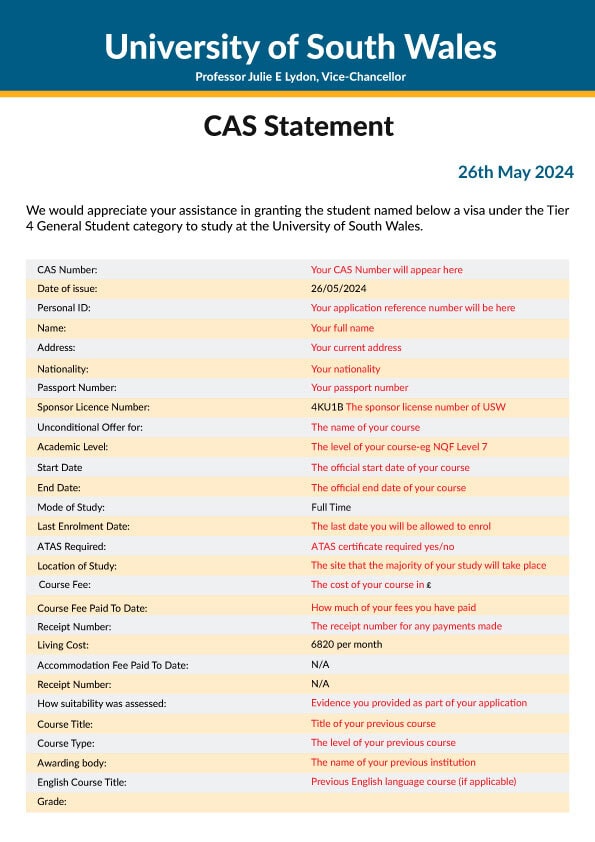Are you applying to universities in the United Kingdom? If yes, then you need to be familiar with the CAS letter UK. Completing your higher education abroad can be an exciting opportunity, but the administrative hurdles can be overwhelming.
From filling out applications to passing English proficiency tests and writing personal essays, there’s a lot to consider. But did you know that you must provide a UK CAS letter alongside other essential documents to initiate the visa application process for studying in the UK?
Yes, you heard it right!
It is the most essential document that can be the turning point of your UK study visa application process. If you need complete information on the Confirmation of Acceptance for Studies (CAS) letter from the UK, read ahead.
In this blog, we’ll discuss the importance of the CAS letter and guide you through the necessary steps to acquire it.
What is a CAS Letter UK?
The Confirmation of Acceptance Letter is a personalized letter from the educational institution you have applied to. It is one of the most important pieces of evidence needed to obtain a UK visa. It confirms that the university has accepted your application and that you are now eligible for a UK study visa.
Requirements for CAS
To apply for your UK CAS letter, you need to fulfill certain requirements. For this, you’ll have to submit the following documents:
- Original documents and credentials
- Mark sheets and other academic transcripts
- Updated passport
- Financial evidence
UK institutions send CAS letters and numbers to international students who have accepted the offer and paid the deposit payment for the program. After the CAS acceptance letter is sent, the students can initiate the UK study visa application process.
Before the issuance of CAS, the university sends an offer letter. The next steps for each university in the UK can be different. However, when students accept the offer letter, the university tells UK Visas & Immigration (UKVI) regarding the student’s acceptance to the university. In addition, it also asks for the CAS number on the student’s behalf. UKVI gives the CAS number to the university, which then the university sends to the accepted student.
Steps to Apply for a CAS Letter UK
Here are the easy steps through which you can apply for a CAS letter UK:
1. Accept the Offer Letter and Pay Your Fees
The first step in applying for a CAS letter in the UK is to accept your offer letter. This letter can either be conditional or unconditional. To receive this, students must pay the acceptance fee, which can be around £6,000.
In addition, international students must provide evidence of their academic qualifications and English language ability (if required). These documents are essential to obtaining the offer letter.
Once you have submitted all these documents, paid your acceptance fee, and accepted an unconditional offer, you are good to go.
2. Wait for Your CAS Issuance
After you have provided all the required information and documents, you’ll have to wait for your institution to issue your CAS. This may take some time, so you should apply well ahead of time than the expected start date of your study program in UK.
3. Receive CAS
After your CAS is provided to you, you will be notified electronically from your institution. Be sure to examine all the details of your CAS to make sure they are right.
4. Apply for the UK Study Visa
When you receive your CAS letter, you will be able to apply for your student visa (usually a Tier 4 visa for full-time students). To submit the study visa application, you’ll need to fill out the online application form, submit the application fee, and make an appointment for biometrics at the visa application center.
Besides, you will have to submit various other documents among which your CAS, passport, financial evidence, and any other necessary documents will be included.
For a deeper understanding of all the documents required to apply for a UK study visa, try reading this blog: Complete Guide to UK Student Visa Application.
UK CAS Letter Sample
What to Do Next?
So, you have made up your mind to complete your university studies in the UK but are now feeling confused by all the requirements, including the UK CAS letter. Don’t worry! You are not the only student who is feeling a bit lost in the endless sea of information.
Almost all students feel the same, and that’s the reason StudyWise is here to lend a helping hand. Our team of student counsellors and visa experts work hard to fulfil all of your dreams of studying in the UK!
So, what’s the wait for?
Contact us today, and let us guide you through the course and university selection process, as well as the entire visa application journey in the UK.
Download Our App
Attention everyone! We have brought an incredibly useful AI-based app for international students like you. On it, you can scroll through and select the right courses and universities in your preferred country all over the world. So, without wasting any further time, download it now from the App Store or Play Store.
FAQs:
How long does it take to get a UK CAS letter?
Generally, most British universities can take 2 to 10 working days to issue the CAS letter. Before the issuance, the institution needs to verify the documents and details that you have provided.
If all goes well, students will receive the CAS letter. However, if you encounter a delay, you should contact the university.
Who needs a CAS letter UK?
All international students who desire to acquire their higher education at a UK educational institute need a CAS letter in order to obtain a student visa.
Moreover, former students who want to further study in the UK need to apply for a separate CAS letter from the concerned university.
Is a CAS interview compulsory?
No. The UK has not mandated a CAS interview for the visa application process. Nevertheless, in some situations, the UK Visas and Immigration Authority may conduct interviews or request more information to check the authenticity of the application.
These interviews are not usually expected but may be necessary in some cases.
Can a visa be rejected after the issuance of a CAS letter UK?
Yes. A CAS letter does not guarantee your study visa in the UK. If you fail to meet the set requirements or have inconsistencies in your application, your visa can be denied. However, when you apply with a CAS letter for your UK student visa, it will certainly improve your chances of acceptance.




